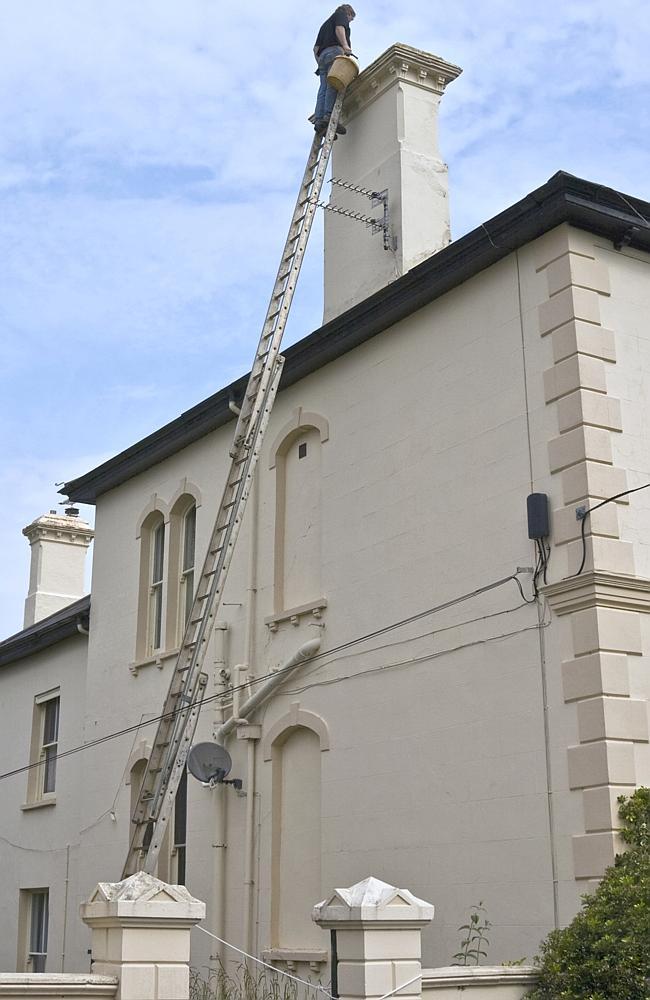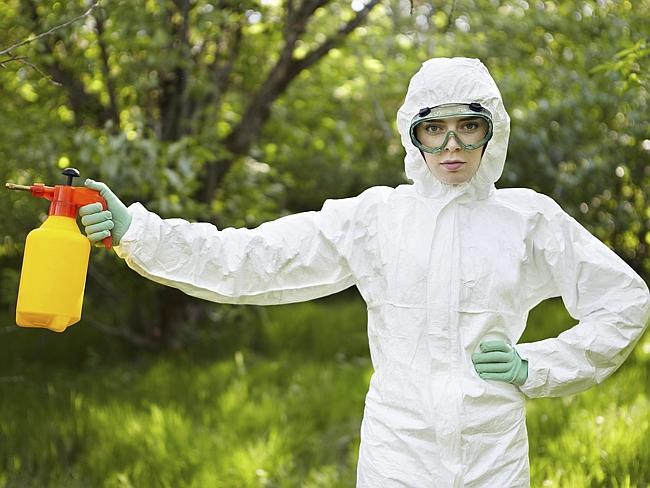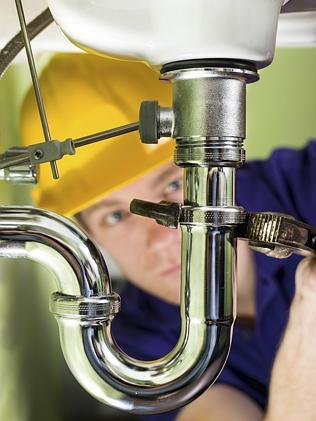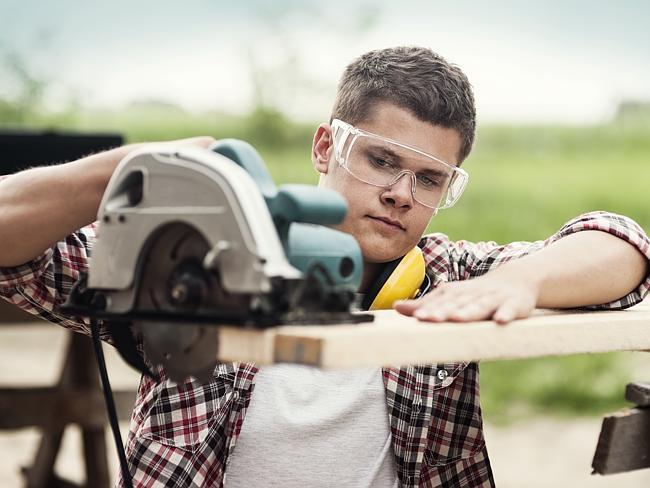Home handymen warned play it smart and avoid DIY disasters
IT’S generally said that Australia is a country of doers but even those with the best of intentions should think twice before embarking on DIY jobs.
IT’S generally said that Australia is a country of doers but even those with the best of intentions should think twice before embarking on do-it-yourself jobs.
Homemaker reality TV shows like The Block are inspirational for people looking to capitalise on their property but don’t be fooled into thinking you too can arm yourself with a hammer and go hell for leather.
On any given weekend, hospital staff are attending to DIY-ers who have come undone. Be it with a hammer, having fallen off a ladder or been inexperienced with a handsaw. You name it, they’ve seen it.
Professor Tim Driscoll, from the University of Sydney, says “unpaid work in and around the home is a common and potentially high-risk activity”. Really? It’s hardly warfare, but many homeowners now carry scars as proof.

His main research interest is in the epidemiology of work-related injuries and diseases.
His paper, published some years ago about fatal injuries from unpaid work at home, is a bleak reminder of what can go wrong.
The study revealed men had 10 times the risk of fatal injury compared with women, and the most common activities resulting in fatal injuries were home repairs, gardening and car care.
Tim explains that being hit by inadequately braced vehicles during car maintenance, falls from inadequately braced ladders, contact with fire and flames while cooking, and contact with electricity during maintenance were the most common injury scenarios.
| TRIPLE DUNCE |
Paramedics across the state would be all too familiar with these.
Between January and June last year, NSW Ambulance attended to a significant number of people who suffered serious injury including severed fingers from the use of power tools such as electric saws, angle grinders and drills.
During the same time, at least 17 people were treated for similar injuries to hands and feet using lawnmowers, mulchers and hedge trimmers.
Many more injuries involved people falling from ladders.
NSW Ambulance Inspector John Brotherhood says the path to home renovation had been paved with “good intentions that had often turned traumatic”.
“People get on the roof and tie themselves to the TV antennae but it’s not strong enough so they fall off. Or they’re inside nailing things to the wall and they don’t know where the electricity is and electrocute themselves,” he says.

John says 000 calls in relation to power tools were particularly frequent.
“We had a guy who decided to trim his hedges so he thought a good idea would be to pick up his lawnmower and run it across the top of his hedges and it took the ends of his fingers off on both sides when he put them under the lawnmower. Ninety minutes later, we had exactly the same job about 4km away. The patient said he had been travelling home and saw this earlier bloke trimming the hedges with the lawnmower and thought, ‘That’s a good idea’.”
Paramedics have also attended to welders who don’t use a face mask and get welder’s flash; people suffering electric shocks from DIY disasters; and homeowners who have collapsed from makeshift ladders and stands.
It’s common sense but John says that if people want to undertake their own repair work, they should first seek expert advice, and carry out the job in the company of another.
Finally, he also advised people to wear protective gear when using garden sprays and weed killers.
“We are often called to treat people who have poisoned themselves. They’re usually wearing shorts and a T-shirt, the wind’s blowing and they get themselves covered in it.
“Make sure it’s a poison that’s safe, read the label and follow instructions. If you are advised to wear protective gear, wear protective gear.”
| BE SWITCHED ON |
Thinking of starting a DIY project? Try painting. Department of Fair Trading Commissioner Rod Stowe says don’t even think about touching the electricity or plumbing.
All specialist work in NSW including plumbing and electrical must be undertaken by a licensed tradesperson.
A licence is required regardless of the cost of the work or whether the work is residential, commercial or industrial.
An electrical licence is required before any electrical wiring work can be undertaken.

Electrical wiring work means the actual physical work of installing, repairing, altering, removing or adding to an electrical installation or the supervising of that work.
Further, Rod says a plumbing licence is required to carry out water plumbing, roof plumbing and sewerage works.
Water plumbing includes fire sprinkler system works, urban irrigation and water supply. This includes any work on pipes and fittings in a building in which any part of a sewerage service is connected to a septic tank.
Under the Plumbing and Drainage Regulation 2012, an unlicensed individual can only replace tapware or a shower head.
Bunnings Warehouse runs practical DIY courses that don’t include major renovations.
“Our Father’s Day billycart workshops are always popular with dads and kids,” says Bunnings NSW ACT Operations Manager, Ian Hughes.
“Workshops for inspirational projects, such as how to plan a kitchen or bathroom, also prove be popular.
“Bunnings’ DIY workshops can help customers learn how to use tools [but] projects requiring electrical or plumbing work should always be completed by a qualified professional.”
| SAFETY TIPS |
Power tools

Ladders
Hazardous materials
| FLUSHED WITH EMBARRASSMENT |
AT some point you just have to laugh.
Sydney plumber Michael Downing pocketed $5000 courtesy of Reece as the winner of last years’ DIY Disasters competition thanks to this makeshift laundry piping.

Michael found the winning entry when he was called to a home to fix a mysterious leak.
“We cleared out the cupboard under the laundry sink, found that someone had cut a plastic milk bottle in half and taped it to the drain as a replacement for the missing section of pipe,” says Michael.
The discovery was one of the funniest DIY disasters he’d come across in an 18-year career but also reinforced the seriousness of what can go wrong.
Reece Plumbing’s business development manager Adam Watson has seen hundreds of entries over the years.
“All too often, people don’t realise the risks to both safety and health that DIY plumbing jobs can pose,” says Adam.
He also warns that while the idea of saving money by DIY is understandable, a botched job will cost you more in the long run.
Source: NSW Ambulance Services
Pictures: Thinkstock, Reece
More



